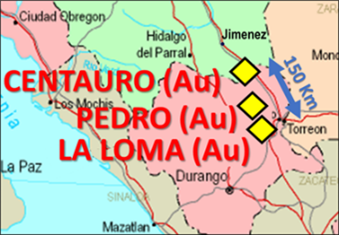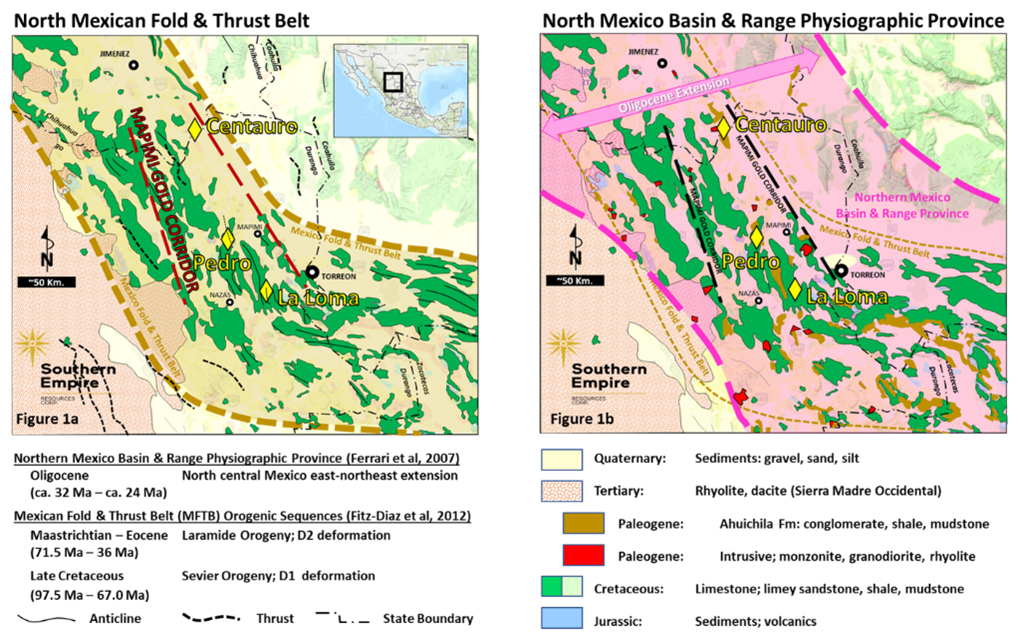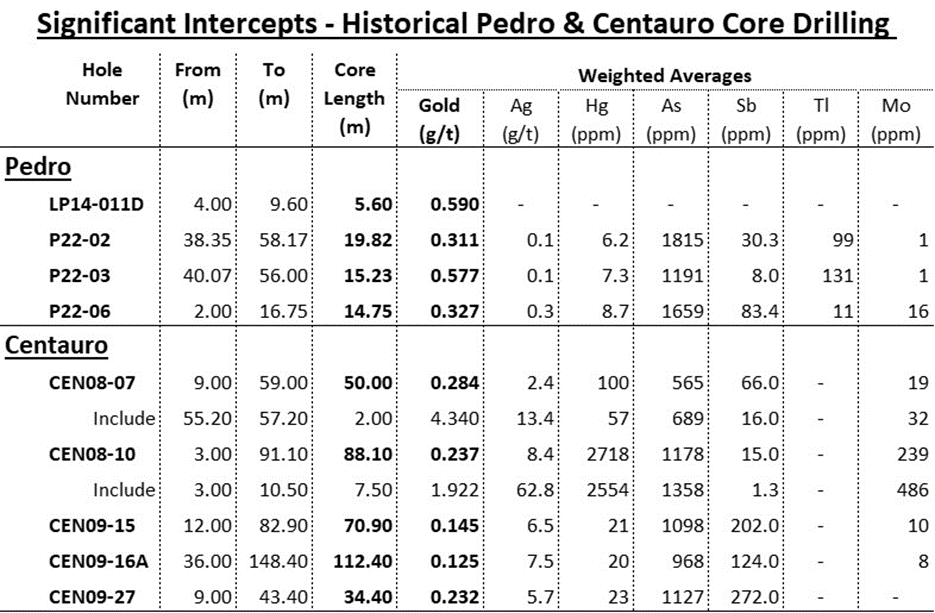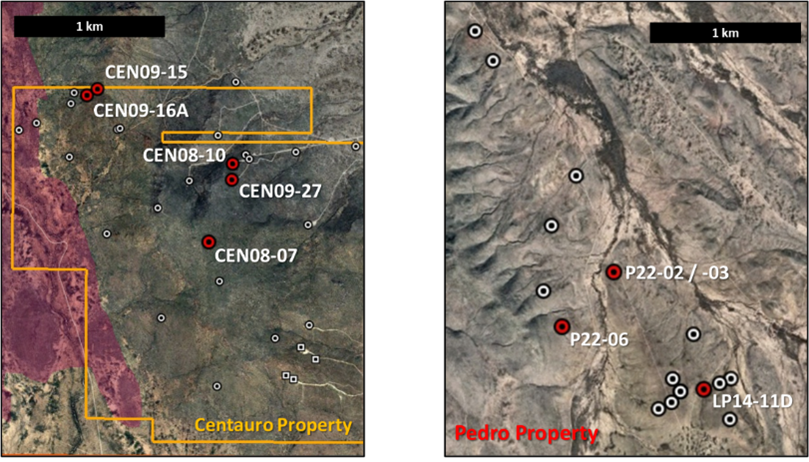Southern Empire Summarizes Its 2022 México Gold Exploration Programs and Proposes That the “Mapimí Gold Corridor” May Be a New Carlin-Style Gold Belt
Southern Empire Resources Corp. has announced findings from its Pedro Gold Project in Durango, México, indicating mineral similarities to the Carlin gold deposits in Nevada. Through Synchrotron Micro-XRF studies, the company presents evidence supporting the potential existence of a new gold belt named the Mapimi Gold Corridor. The CEO emphasized the strategic importance of these findings for exploration efforts. Additionally, Southern Empire provided an overview of its 2022 exploration activities and updates on option agreements, including those with Commander Resources Ltd.
- Discovery of mineralogical similarities to Carlin-style gold deposits enhances exploration potential.
- Establishment of the Mapimi Gold Corridor could indicate significant new gold resources.
- Gold was not identified in the limited samples analyzed, which may raise concerns about economically viable deposits.
VANCOUVER, BC / ACCESSWIRE / February 14, 2023 / Southern Empire Resources Corp. (Southern Empire; TSX-V:SMP; Frankfurt:5RE; OTC:SMPEF) announces that detailed Synchrotron radiation micro-X-Ray Fluorescence (Synchrotron Micro-XRF or SRµ-XRF) mineralogical studies of gold-enriched drill core samples from its Pedro Gold Project in Durango, México, reveal certain, specific mineralogical similarities to the unique ore mineralization of the world-class Carlin gold deposits in north-central Nevada. Although preliminary in nature, this mineralogical work together with many other noted geological similarities supports the possibility that a new belt of Carlin-style gold deposits, named the "Mapimi Gold Corridor" by Southern Empire, may exist in north-central México.
"The idea that there could be a metallogenic trend of bulk-minable, sediment-hosted gold deposits in north-central México makes for a very compelling exploration strategy," explained Dale Wallster, Southern Empire's CEO adding, "Now, with the Synchrotron Micro-XRF analyses of Pedro drill core specimens, we have strong mineralogical evidence that further supports the classification of the Pedro gold mineralization as "Carlin-style", an important concept that will be applied to our exploration modelling."
Also herein, Southern Empire provides a summary of its 2022 north-central México exploration strategies, property acquisitions, and an update regarding option agreement amendments with Commander Resources Ltd. (Commander).
Pedro Gold Project: Drill Core Synchrotron Micro-XRF Mineralogical Study
Detailed mineralogical studies were conducted at the U.S.A. Department of Energy's Argonne National Laboratory Advanced Photon Source (APS) in Chicago, one of the most technologically complex research facilities in the world, by Dr. Lisa Van Loon of LISA CAN Analytical Solutions Inc. (LISA CAN) in collaboration with Dr. Neil Banerjee of Western University. There, synchrotron facilities that generate ultra-bright, high-energy X-rays were used to map microscopic pyrite grains in core samples collected from Southern Empire's Pedro Gold Project drill hole (DDH) P22-02; see Photo 1 showing DDH P22-02 core interval 46.10m to 47.14m.
In the Carlin-type gold deposits of north-central Nevada, a ubiquitous suite of "pathfinder" or "indicator" trace elements, which include arsenic (As), mercury (Hg), thallium (Tl) and antimony (Sb), often occurring together with submicron-sized gold (Au) particles in As-rich rims (a chemical zonation feature referred to as "fuzzy" rims) that formed around unmineralized pyrite cores during ore-mineralizing processes (Longo, Cline and Muntean, 2009; Palenik et al, 2004 & Barker et al, 2009; cited in Gopon et al, 2019).
The initial LISA CAN SRµ-XRF mineralogical study further supports Southern Empire's hypothesis that gold mineralization at Pedro is potentially Carlin-style (see Photo 2). A summary of this study follows:
- SRµ-XRF analyses were conducted on representative pyrite grains in sample SER-2B.
- The exceptional operating conditions (<2µm spot size) allowed the identification of trace elements Hg and Tl associated with pyrite grains and the arsenic (As) altered rims of pyrite grains.
- Hg and Tl occur together in the As-rich rim of pyrite grain SER-2B-1-1 (see Photo 2).
- Although the core interval assayed 0.750 grams gold/tonne (g Au/t; an average of repeated samples S43451 & S43451R), no gold was identified in the limited number of samples studied using SRµ-XRF.
- Hg and Tl are not associated with each other.
- Hg is heterogeneously distributed in most pyrites.
- Characteristic Sb L-edge XRF emission peaks could not be resolved from strong Ca-K edge XRF emission peaks.

Photo 1: Source drill core interval of Pedro Gold Project DDH P22-02 for Synchrotron Micro-XRF mineralogical study of microscopic pyrite grains. The section above, from 46.10m to 47.14m (outlined in green) assayed 0.750 g Au/t (average of repeated samples S43451 & S43451R) and exhibits zones of disseminated blebs to semi-massive clots of orpiment (As2S3; yellow mineral) in intervals of silicified, brecciated limestone conglomerate containing microscopic pyrite grains.

Photo 2: SRµ-XRF multi-element mineral mapping shows the distribution of iron (Fe), arsenic (As), mercury (Hg) and thallium (Tl). Hg and Tl occur together in an As-rich rim on a pyrite grain (the orange/red mineral in the Fe map). Tl also occurs elsewhere in the sample where Hg is not present.

Table 1: Similarities between Southern Empire's Mapimí Gold Corridor projects and Carlin gold deposits
About Synchrotron Micro-XRF Analysis
Synchrotron Micro-XRF analysis is a non-destructive analytical study technique that enables screening for elemental constituents within mineral grains of interest, thus providing important mineralogical data to be applied to mineral deposit classification and exploration. Using a tuneable synchrotron X-ray source provides an intensity that cannot be matched by normal laboratory X-ray fluorescence (XRF) sources. LISA CAN has used the technique in various capacities, including on gold-enriched specimens from various geological deposit settings.
Review of 2022 and Update: México Gold Exploration and the Mapimí Gold Corridor
During 2021 and 2022, Southern Empire acquired by option and staking three gold projects with bulk-tonnage scale potential in north-central México:
- Centauro Gold Project, Jiménez Municipality, Chihuahua State;
- Pedro Gold Project, Mapimí Municipality, Durango State; and,
- La Loma Gold Project, Nazas & Lerdo Municipalities, Durango.

These three separate gold projects are located along an approximately 150-kilometre (km), southeast trending, Oligocene tectonostratigraphic geological belt that Southern Empire is referring to as the Mapimí Gold Corridor.
The Centauro and Pedro Gold Projects have been the subject of significant historical exploration work, including detailed geological and satellite spectral alteration mapping, grid-controlled soil geochemistry, magnetic and induced polarization geophysical surveys, and drilling (Centauro: 5,795 metres (m) core in 27 holes; Pedro: 1,265.0 m core in 8 holes and 1,335.5 m reverse circulation in 9 holes).
On July 23, 2021, Southern Empire entered into an option agreement (the Pedro Agreement) with Commander allowing Southern Empire to acquire a
On October 26, 2022, Southern Empire and Commander agreed to a "Second Amendment" such that if Southern Empire staked, optioned or purchased "Additional Properties" in the name of Minera BRG, then Southern Empire is responsible for all costs and maintenance of those Additional Properties, and if it fails to acquire Minera BRG, then all rights and titles in those Additional Properties will immediately be assigned and transferred to a Mexican subsidiary designated by Southern Empire. No changes to the underlying payment structure of the July 23, 2021 option result from either the First or Second Amendment.
On November 10, 2022, Southern Empire, through Minera BRG, signed a comprehensive Option Agreement to acquire
In December, 2022, Southern Empire (through Minera BRG) staked and registered two new claims at Centauro and one new claim at La Loma. These new claims, while duly registered, require final approval, which is pending pursuant to a ruling from México's Federal Government. Taxes are not due until the claims are approved, although some exploration is permissible.
Details regarding the Pedro, Centauro and La Loma property acquisitions are provided in Southern Empire's news releases dated: July 26, 2021, December 12, 2022 and December 19, 2022.
The "Mapimi Gold Corridor"
At Centauro and Pedro, and to an extent, the lesser studied La Loma, a range of similar and specific geological, mineralogical, alteration and geochemical features are noted and these that support Southern Empire's theory of the Mapimí Gold Corridor being a unique, newly recognized metallogenic belt potentially hosting Carlin-style gold deposits (see Table 1).
The Mapimí Gold Corridor (see Figures 1a and 1b) is situated along the northwestern end of the Cretaceous carbonate stratigraphy of the Mexican Fold and Thrust Belt where east-west Oligocene extension led to the development of the Northern México Basin and Range physiographic province.
The Mapimí Gold Corridor is highlighted by the occurrences of gold and a suite of specific elements (arsenic, antimony, mercury, thallium) that are indicators of Carlin-style gold mineralization, all of which are present at Southern Empire's Centauro, Pedro and La Loma properties.
As observed at both Centauro and Pedro, gold mineralization is predominantly associated with hematite-stained, weak- to moderately-silicified, brecciated limestone conglomerates of the Eocene to Oligocene Ahuichila Formation. On both properties, the Ahuichila Fm. is predominately represented by limestone dominated, polymictic conglomerates associated with linear NNW trending, probable graben structures. The silicified auriferous breccia zones are typically linear, paralleling the NNW graben trend. The silicified conglomerate zones at both Centauro and Pedro are highlighted by kilometre-scale, coincident geochemical soil anomalies of gold (Au; >10 ppb), arsenic (As; >100 ppm), plus antimony (Sb), thallium ("Tl") and mercury ("Hg"). The Ahuichila Fm. stratigraphically overlies the Late Cretaceous to Eocene Caracol Formation. Overlapping with the period of Oligocene extension, and following the same NNW trend, are scattered various intrusive plutons and plugs of Paleogene monzodiorite to granodiorite.

Figures 1a: North Mexican Fold & Thrust Belt and 1b: North México Basin & Range Physiographic Province
Historical drill results from Southern Empire's Centauro and Pedro Gold Projects include wide intercepts (up to ~112 m) of highly anomalous gold grades; see Table 2. Historical drilling at both properties has been widely spaced (drill collars typically spaced >300m apart) and relatively shallow, with most holes penetrating to vertical depths of less than 200 m.

Table 2: Gold Assay results from historical drilling at the Pedro and Centauro Gold Projects

Figures 3a & 3b: Centauro (left) and Pedro (right) properties showing historical drill holes with significant intercepts from Table 2.
Further discussions of the Centauro, Pedro and La Loma properties are provided in Southern Empire's news releases and quarterly filings of Management Discussion and Analysis (MD&A), available on SEDAR.
Qualified Person (QP)
The scientific and technical information contained in this news release has been prepared, reviewed and approved by David Tupper, P.Geo. (British Columbia), Southern Empire's VP Exploration and a Qualified Person (QP) within the context of Canadian Securities Administrators' National Instrument 43-101; Standards of Disclosure for Mineral Projects (NI 43-101). Some of the historical analytical data presented in this news release were obtained from public disclosures and data of the Secretaria de Economia de Mexico (SGM), Silver Spruce Resources Inc. and Mundoro Capital Inc. and have not been verified by the QP.
About Southern Empire Resources Corp.
Southern Empire is focused on the acquisition, exploration and development of metals and minerals deposits in North America.
In northeastern Durango State, México, Southern Empire has an option to acquire a 100-percent beneficial interest in the 1,750-hectare Pedro Gold Project. At Pedro, in the spring of 2022, Southern Empire drilled gold mineralization approximately 800 metres from 2014 drilling by a subsidiary of Newmont Mining Corporation. Gold mineralization, associated with highly anomalous arsenic (orpiment and realgar common), antimony, mercury and thallium, has been identified hosted in permeable basal conglomerates deposited during Oligocene extensional deformation, the latter forming widespread Basin and Range physiography along the easter part of Sierra Madre Occidental. Gold is present in 12 of the 17 holes drilled at Pedro to date. Please see Southern Empire's news releases posted on SEDAR for further details.
In the Cargo Muchacho mountains of Imperial County, California, Southern Empire owns 100 percent of the historical gold-producing American Girl mine property and holds options to acquire a 100 percent interest in the adjacent 2,160-hectare (5,338-acre) Oro Cruz Property located approximately 22.5 kilometres (14 miles) southeast of the operating Mesquite gold mine of Equinox Gold Corp.
At Oro Cruz, extensive historical drilling and large-scale open-pit and underground mining of the American Girl, Padre y Madre, Queen, and Cross oxide gold deposits by the American Girl Mining Joint Venture ("AGMJV") occurred between 1987 and 1996. During that time, gold was recovered by either heap leaching of lower-grade, or milling of higher-grade ores until AGMJV operations ceased in late 1996 because of declining gold prices leaving the Oro Cruz Property with many gold exploration targets in addition to a historical inferred resource estimate, reported In 2011 by Lincoln Mining Corp., totaling 341,800 ounces gold based on 4,386,000 tonnes averaging 2.2 grams gold per tonne (g Au /t) at a cut-off grade of 0.68 g Au/t (4,835,000 tons at 0.07 ounce gold per ton; please refer to the Cautionary Notice Regarding the Oro Cruz Property Historical Resource Estimate below).
On behalf of the Board of Directors of Southern Empire Resources Corp.,
Dale Wallster, CEO and Director
For further information on Southern Empire please visit: www.smp.gold and SEDAR or contact: Lubica Keighery, (778) 889-5476, lubica@smp.gold .
Cautionary Notice on Forward-Looking Information
Information provided in this news release may contain forward-looking information or forward-looking statements that are based on assumptions as of the date of this news release. Such information or statements reflect management's current estimates, beliefs, intentions, and expectations and are not guarantees of future performance. Southern Empire cautions that all forward-looking statements are inherently uncertain and that actual performance may be affected by many material factors, many of which are beyond its respective control. Such factors include, among other things: risks and uncertainties relating to Southern Empire's limited operating history, the need to comply with environmental and governmental regulations, results of exploration programs on its projects, and those risks and uncertainties identified in its annual and interim financial statements and management discussion and analysis. Accordingly, actual and future events, conditions, and results may differ materially from the estimates, beliefs, intentions, and expectations expressed or implied in the forward-looking information. Except as required under applicable securities legislation, Southern Empire undertakes no obligation to publicly update or revise forward-looking information.
Cautionary Notice Regarding Historical Resource Estimate
The Oro Cruz Project historical resource estimate is disclosed in a technical report dated April 29, 2011, prepared for Lincoln Mining Corp. by Tetra Tech, Inc. and filed on Canadian Securities Administrators' System for Electronic Document Analysis and Retrieval ("SEDAR"). It is termed an inferred mineral resource, which is a category set out in NI 43-101. It was based on historical reverse circulation and core drill hole sample, underground channel sample, and blasthole sample assay results and calculated using ordinary kriging to estimate gold grades in 10-foot-by-10-foot-by-five-foot blocks. Accordingly, Southern Empire considers this historical estimate reliable as well as relevant as it represents key targets for future exploration work. However, a QP has not done sufficient work to verify or classify the historical estimate as a current mineral resource and Southern Empire is not treating this historical estimate as current mineral resources.
Cautionary Notice Regarding Exploration Work Programs
The timing and the ability to conduct Southern Empire's exploration programs are, among other things, contingent on: governmental regulations allowing for the issuance of permits; affects of the COVID-19 pandemic; and the availability of exploration personnel, drill contractors, equipment, lodging, etc. Southern Empire will adhere to COVID-19 directives regarding safe working practices putting worker and community health and safety first and will proceed with exploration and development work programs only if potential COVID-19 risks can be effectively managed.
Neither the TSX Venture Exchange nor its Regulation Services Provider (as that term is defined in the policies of the Exchange) accept responsibility for the adequacy or accuracy of this release.
SOURCE: Southern Empire Resources Corp.
View source version on accesswire.com:
https://www.accesswire.com/739298/Southern-Empire-Summarizes-Its-2022-Mxico-Gold-Exploration-Programs-and-Proposes-That-the-Mapim-Gold-Corridor-May-Be-a-New-Carlin-Style-Gold-Belt
FAQ
What are the findings from Southern Empire Resources regarding the Pedro Gold Project?
What is the Mapimi Gold Corridor?
What does the Synchrotron Micro-XRF analysis reveal about gold at the Pedro Gold Project?
When was the press release by Southern Empire Resources announced?







